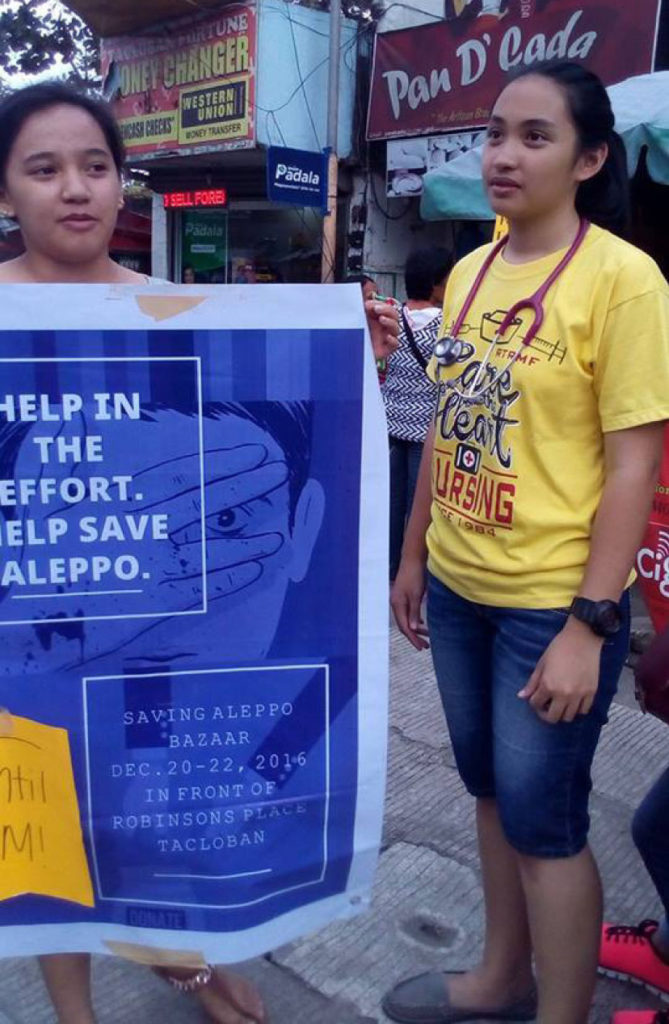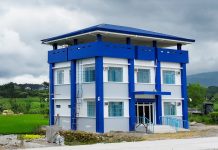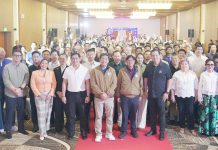
Giving back after world responded due to “Yolanda”
TACLOBAN CITY- Where is Aleppo?
To majority of us, Aleppo may sound unfamiliar but for a group of students of this city, the place is where they intend to give the money that they collected out of selling “ukay-ukay” or used clothings.
For three days, Frances Anido, 18 and her friends not only endured rains and dusts to sell the used clothings in a busy street along Marasbaras district that they have collected but also tried to explain to their buyers about Aleppo, a city in Syria that is besieged with civil war that resulted to deaths of thousands of men, women and children.
Anido, a second year nursing student at the RTR Medical Foundation, and her seven friends, put up a stall covered with a huge umbrella as they sell the used clothings to the public whom they say “are not also familiar with what is happening in Aleppo.”
“My friends decided to come up with this undertaking because what we see in TV in Aleppo breaks our heart, especially those involving innocent children,” she said.
“They should not suffer or experience this kind of horror at their young age,” Anido added.
In particular, they were touched and troubled on the video involving Omran Daqneesh, who was hit during an air strike.
His haunting photo, sitting in silence inside an ambulance, touched the hearts of the world as he was declared as the “face of Aleppo.”
By raising funds out of selling the used clothings that they collected from among themselves and their friends, they hope to help the victims, particularly the children displaced by the five-year civil war in Aleppo.
The group started collecting the used clothings early this month. “We were glad that some of friends and even friends of our friends, when we explained to them the purpose, immediately gave their share,” Anido said.
For three days, which they started on Wednesday(December 21), of selling used clothings, the group raised about P15,000.
“We will convert it into dollars and send it online to Save the Children,” Anido said, referring to an international humanitarian organization that primarily aims to help children affected by disaster, man-made or natural.
Incidentally, Save the Children was among the international humanitarian groups that responded when Tacloban City was pummeled when it was hit by supertyphoon “Yolanda.”
“The world helped us when we we’re hit by Yolanda and I guess, we should somehow extend help to those who are in dire need like Aleppo,” Anido said.
Her friend, Raven Bolino, 17 who is from Basey, Samar and taking physical therapist at the RTR School, put up a monitor wherein videos showing the war in Aleppo were shown.
“By showing the video to our buyers, they get to know what is happening in Aleppo. Admittedly, many of us are not aware on what is happening in Aleppo and where it is located,” Bolino said.
She said that they also explained to their buyers what is happening in Aleppo.
“Some of them buy our items because we sell them at lower price. But we explain to them why we are selling these used clothings. We explained to them what’s happening in Aleppo and we show them the video,” Bolino said.
They sold their items ranging from P20 up to P60.Evangeline Globioso,50, from Palo, Leyte, admitted that she is not aware that such a place exists or what’s happening there.“Glad to know that they are doing this for a cause. I am poor so I could only buy one item,” Globioso said. A man, who saw them selling used clothings and for what purpose, left a message to the group: “We need people like you.”
This simple message, Anido and Bolino said, “was unexpected but warms our hearts.” (JOEY A. GABIETA)



